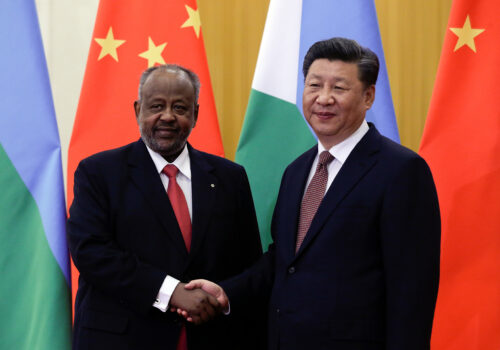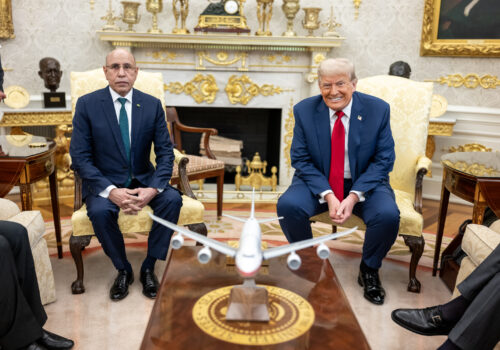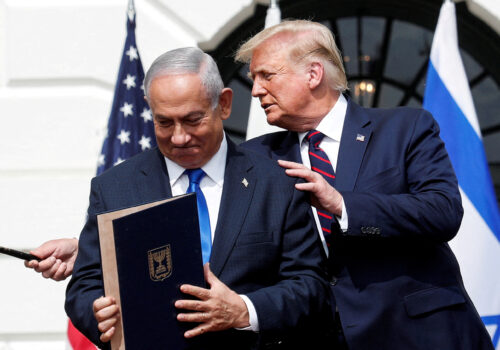Gateways to the Red Sea: The case for Israel–Somaliland normalization
Often described as a rare island of stability amid regional fragility, Somaliland is increasingly attracting interest from both global and regional powers, including the United States and Israel.
The Abraham Accords have redefined Israel’s geopolitical and economic standing in the Middle East by normalizing relations with the United Arab Emirates (UAE), Bahrain, Morocco, and Sudan, forging partnerships once unthinkable. Ever since, much of the focus has been given to the prospect of normalization with Saudi Arabia, while the strategic and economic potential of relations with Somaliland has been largely overlooked.
Somaliland’s location along the Gulf of Aden, with its 460-mile coastline near the strategically significant Bab al-Mandab Strait, positions it at the crossroads of global maritime security. With nearly a third of global shipping passing through this corridor, threats from piracy, weapon smuggling, and terrorist groups like al-Shabaab and the Houthis have drawn international concern. For both Israel and the United States, Somaliland presents an opportunity for strategic collaboration.
Israel and Somaliland should pursue normalization of relations through phased engagement. This process would begin with the opening of liaison offices and the expansion of cooperation across key sectors, gradually building toward mutual recognition and diplomatic relations. Strengthened ties with Somaliland would help Israel secure its Red Sea gateway and counterbalance the regional influence of rival powers, while reinforcing the presence of its allies. In return, Somaliland would gain greater international visibility, a pathway to recognition from Western partners, development support, and enhanced security cooperation.
Governance without recognition
Somaliland reclaimed its independence from Somalia in 1991, but no country has officially recognized its sovereignty due to adherence to the “One-Somalia” policy. The Somali Federal Government considers Somaliland part of its territory and opposes any foreign engagement implying recognition. Despite this, Somaliland functions as a de facto independent entity, with its own constitution, government, military, and currency. It maintains full internal control and upholds a relatively stable, democratic system. In 2025, the non-profit organization Freedom House rated Somaliland forty-seven out of one hundred, compared to Somalia’s score of just eight, highlighting the disparity in political and civil liberties.
SIGN UP FOR THIS WEEK IN THE MIDEAST NEWSLETTER
Nevertheless, Somaliland has established unofficial diplomatic and trade relations with several nations, notably the United States, UAE, and Taiwan—all of which maintain representative offices in Hargeisa. Neighbors Ethiopia and Djibouti also engage with Somaliland, particularly through economic partnerships centered on the Berbera port. Strategically located on the Gulf of Aden, the port serves as Somaliland’s main commercial gateway and has the capacity to handle up to 500,000 TEUs (standard containers) annually.
Israel’s historical engagement with Somaliland is limited, having briefly recognized Somaliland in 1960 before it merged with Italian-administered Somalia. Despite the absence of formal ties, occasional attempts from both sides have surfaced over time. In 2010, the Israeli Foreign Ministry spokesman stated that Israel was ready to recognize Somaliland again if approached. In 2020, Somaliland expressed public support for Israel’s normalization with the UAE.
Furthermore, in an interview conducted in April 2025, Somaliland’s Minister of Foreign Affairs, Abdirahman Adam, expressed openness to normalization with Israel. “Somaliland, like any responsible government, considers its foreign relations through the lens of national interest, regional stability, and the values of its people. If those align, we are open to discussion with any nation,” he stated.
Securing the Strait: Strategic stakes in the Red Sea
Somaliland’s location places it at the center of efforts to secure one of the world’s busiest shipping corridors. This region faces persistent security challenges and militant activities from al-Shabaab and the Houthis. The latter, backed by Iran, have escalated their attacks since late 2023, targeting commercial vessels and causing widespread disruption in the Red Sea.
For Israel, these developments are particularly concerning. The Red Sea is a crucial artery for its trade and defense, linking it to markets and partners across Africa, the Gulf, and Eastern Asia. Since October 2023, the Houthis have declared a naval blockade targeting shipments to Israel, and over one hundred attacks have prompted shipping companies to reroute vessels around the Cape of Good Hope, adding significant delays and increasing shipping costs.
These threats have drawn international attention, prompting a coordinated response led by the United States through “Operation Prosperity Guardian”. Somaliland, unlike Somalia, has largely succeeded in keeping extremist groups and piracy at bay, thanks to an increasingly developed local coast guard and growing naval cooperation.
Reports suggest that Israel already operates an intelligence base in the Dahlak Archipelago off the Eritrean coast, which serves to monitor Iranian activities; and recent reports even indicate that Somaliland is considering allowing the establishment of an Israeli base on its soil, in exchange for recognition and investments. Military cooperation with Somaliland could provide Israel with greater strategic depth in the Red Sea region. Aligned with US interests, it offers opportunities for trilateral Israeli-American-Somalilander maritime security exercises and intelligence-sharing.
Power plays in the Horn of Africa
The geopolitical landscape of the Horn of Africa presents further complexities. It has become a hotspot for competition among international and regional powers seeking to expand their influence and secure their interests through military, economic, and diplomatic initiatives.
Washington maintains its largest African military base, Camp Lemonnier, in Djibouti, which serves as a hub for regional counterterrorism and maritime operations as part of the United States Africa Command (AFRICOM). China, meanwhile, has expanded its footprint by constructing its own base nearby and investing heavily in port infrastructure. Turkey has strengthened its ties with Somalia through military training programs and a base in Mogadishu. The UAE has developed strong ties with Somaliland, most notably through a $442 million investment in the expansion of the Berbera port and the establishment of a military base.
An Israeli partnership with Somaliland would advance shared security interests with its allies, the United States and the UAE, and build on Abu Dhabi’s existing foothold in Berbera. Indeed, the UAE could play a pivotal role, as it enjoys trust in Hargeisa and ties to Jerusalem.
Nevertheless, Israel’s entry into this competitive landscape must be carefully managed to avoid escalating tensions with other regional stakeholders. Both Turkey and Iran are likely to perceive Israeli engagement with Somaliland as a threat to their own influence. Turkey, a key ally of Somalia, would likely reiterate its support for Somali territorial integrity, as it did during the Ethiopia-Somaliland port deal crisis, and could strengthen its security assistance to Mogadishu to reinforce its position. Iran, meanwhile, may turn to its regional proxies to raise the stakes. Given Somaliland’s proximity to Yemen, the Iran-backed Houthis could be used to threaten Somaliland or any emerging Israeli presence there.
Still, these power plays can be navigated with careful diplomacy. Israel should align its efforts with those of its allies and frame its Somaliland engagement as a contribution to regional security and development rather than a threat.
Economic benefits for both
Beyond security, normalization opens the door to economic cooperation that could benefit Israel, Somaliland, and their mutual partners.
Somaliland’s economy relies heavily on livestock exports—particularly to Gulf states—but faces challenges in diversifying its economy and modernizing infrastructure. This economic reliance, adding to Somaliland’s careful positioning within the Muslim world, has restrained its willingness to pursue formal ties with Israel thus far.
A key component of its economic strategy is the Berbera port, which serves both Somaliland and landlocked neighbor Ethiopia. Israel, with its expertise in agri-tech, infrastructure development, and water resource management, is well-positioned to contribute to Somaliland’s efforts to diversify its economy. Additionally, collaboration in port logistics, security, and supply chain efficiency would enhance Berbera’s role as a trade hub, attracting investment and fostering regional connectivity. Israeli military expertise could bolster these efforts.
For Somaliland, such cooperation could strengthen economic ties and improve development and security. For Israel, an efficient Berbera corridor could create a supply chain between the Red Sea and Israeli ports in Eilat or Ashdod, gaining Israeli access to emerging African markets while enhancing stability and security along its trade routes. It would also support Israel’s friend and ally, Ethiopia, by enhancing its access to Berbera port, reducing overreliance on Djibouti, where China holds sway.
This was the very promise of the Abraham Accords, where joint ventures in technology, agriculture, and energy have underpinned the agreements’ mutual reputation. Somaliland offers a new frontier for extending the model of peace through prosperity.
The politics around recognition
Somaliland’s lack of international recognition remains a considerable obstacle. The current policy supported by the African Union (AU) underscores Somalia’s territorial integrity, making Somaliland’s recognition a politically sensitive issue worldwide. Moreover, the international community is concerned that recognizing Somaliland could encourage other separatist movements around the world, like in Scotland or Catalonia. This diplomatic isolation limits Somaliland’s access to large-scale foreign investment and formal bilateral agreements.
Mogadishu would likely push back, as it routinely opposes any foreign engagement with Somaliland. For example, it condemned Taiwan and imposed restrictions after Taipei opened a representative office in Hargeisa, and similarly banned Emirati businesses following the UAE’s pursuit of an economic cooperation agreement with Somaliland. Somali leaders could also lobby the Arab League and the OIC to denounce Israel’s move and may even seek action at the UN.
Although Israel does not maintain formal relations with Somalia, limiting the risk of direct diplomatic fallout, it should still consider the implications of its actions on relations with African Union members. The AU is likely to condemn any step toward normalization with Somaliland, seeking to deter others from following suit and potentially encouraging member states to reconsider or downgrade their relations with Israel.
Meanwhile, developments in the United States suggest a shifting tide. US lawmakers have shown bipartisan interest in Somaliland, with congressional delegations visiting Hargeisa and even introducing legislation to deepen ties. In late 2024, reports emerged that US President Donald Trump was considering recognizing Somaliland. Should Washington move in that direction, Israel would likely find a green light to follow suit.
Somaliland may view closer cooperation with Israel as a means to strengthen its case for greater international engagement, particularly with Washington. Inspiration may be drawn from Morocco, which achieved US recognition of its sovereignty over Western Sahara through its normalization with Israel.
Looking ahead
In March 2025, Somaliland’s foreign minister told Israeli media: “All countries that are interested in discussing certain issues with us must first establish working relations with us and open diplomatic missions in Somaliland”.
Israel should take this step. Establishing liaison offices in Hargeisa and Tel Aviv, short of full recognition, would formalize dialogue and mirror the approach taken by other nations.
Israel should also support low-profile, high-impact development initiatives in Somaliland, particularly in areas such as water management, agriculture, and healthcare. These efforts would build capacity and goodwill while avoiding unnecessary politicization. Expanding humanitarian efforts, such as the work already being done by Israeli non-governmental organizations like Save a Child’s Heart, can reinforce people-to-people ties and improve Israel’s image on the ground.
A de-escalation of Israel’s war in Gaza would also likely facilitate diplomatic progress by helping Somaliland’s leadership justify engagement with Israel without risking domestic backlash or regional friction.
Finally, Israel should explore multilateral cooperation with its allies. Joint maritime security exercises and anti-piracy patrols involving Somaliland’s coast guard, Israel’s navy, and US forces would promote mutual security and trust. Over time, this cooperation could evolve into a framework of quadrilateral collaboration among Israel, Somaliland, the United States, and the UAE, similar to the I2U2 Group.
If pursued with strategic foresight and pragmatism, this potential partnership could quietly anchor a more stable and cooperative Red Sea region.
Amit Yarom is a graduate student at the Elliott School of International Affairs at George Washington University. He is a foreign policy researcher, specializing in the Arabian Gulf.
Further reading
Thu, Jul 31, 2025
Djibouti is the next arena for US-China competition in the Red Sea
MENASource By Emily Milliken
Washington could upgrade its Djibouti relationship and secure its foothold along some of the world’s most important waterways.
Wed, Jul 16, 2025
How Mauritania-Israel normalization may boost US posture in the Sahel
MENASource By Sarah Zaaimi
If Mauritania is nearing a deal with Israel, this could be the beginning of a wider re-engagement with Sahel countries.
Thu, Jul 3, 2025
Three Abraham Accords goals Trump should raise with Netanyahu
MENASource By Allison Minor
Between Iran and Gaza, Trump and Netanyahu will have a full agenda during the latter’s visit to Washington.
Image: A ship is docked at the Berbera port in Somalia, May 17, 2015. REUTERS/Feisal Omar


